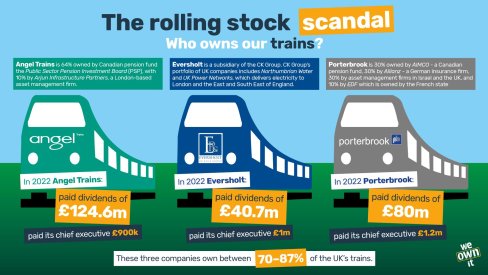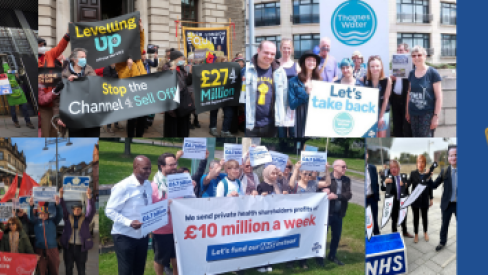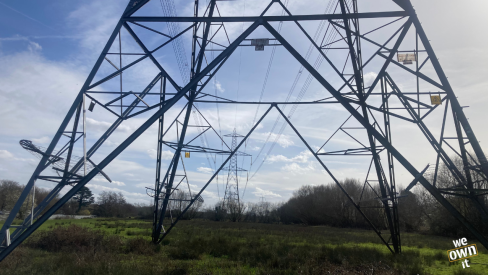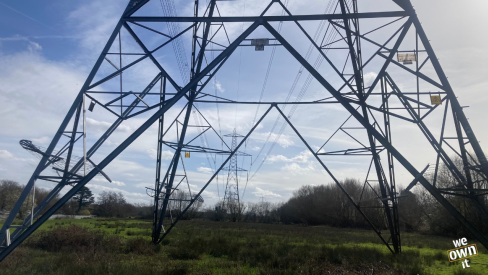
16 March 2018
This week, the president of the CBI (Confederation of British Industry) said that investors are ‘reaching for their coats’ to leave the UK because of the prospect of public ownership. In our new video we’ve told them to embrace a mixed economy instead of defending the failures of privatisation.
We think the CBI is on the wrong side of history with this one. Public ownership will actually strengthen our whole economy, and that’ll be good for everyone - including business.
But if investors *really* can’t think of a better way to make money than by ripping off all of us who use water, energy, rail and Royal Mail, and exploiting our vital services for profit – then we’re happy to tell them: get your coats.
Because we’re taking our public services back.
The CBI is a powerful voice for business in Britain. Will you help us make sure they get the message by sharing this page?
You can also share the video from YouTube, or our post on Facebook and Twitter.

Photo credit: AFP - 20 November 2016















Comments
Henry replied on Permalink
The short-sightedness and complete lack of logic that people in classical economics show boggles the mind. Of course it is better to have services run by the public for the public rather than for profit. That and a move to a post-growth economic system might mean we have a future!
Joshua replied on Permalink
I agree with you. But I quibble with your portrayal this represents "classical economics". Classical economics is value free and is characterised by older ideas such as Keynesian ideas. I think what you are against is, perhaps, neoliberal economics.
Jim Farms replied on Permalink
From Northumbria Water - which was built up by municipalities in NE England there is sent over £600million per annum to a man in Hong Kong! We should have this to spend in the North East!
michael bull replied on Permalink
Who can remember the concept of the mixed economy? That is state ownership of major service sectors in hand with private enterprise in non critical areas such as high street activity, auto sales, you name it. It worked very well in the past before corporate greed was invented!
Daniel Inman replied on Permalink
Oh yes, the "mixed economy". The last person I remember referring to that was the late John Smith as Shadow Chancellor. Before that, at secondary school they were still teaching it when Major was prime minister, just as they were selling the railways off. ...
David Bacon replied on Permalink
This fairytale has been around for years. Where are these investors going? To France or Germany or other countries where many important services are publicly owned? I doubt if many actually are "reaching for their coats" and if they are, they should be reminded how dispensable they are.
Manda Scott replied on Permalink
We are at a turning point - we can continue to see essential services bled dry in the rush to fund shareholders above all else - or we can take them into common ownership and create decent jobs and decent services. I vote for the latter, every time.
David Bacon replied on Permalink
I doubt very much if investors are reaching for their coats. Where will they go? Many European countries have and have had successful state owned industries for years. Our privatised, once owned state owned
industries are rip off merchants pass excellence.
sara-lea small replied on Permalink
It is so very clear that Capitalism has run its course and has clearly not succeeded in making this a better world. Obviously we need to develop communities and work with eachother, rather than being motivated by excess
Janet Bungay replied on Permalink
Public services like health and social care are not suited to a corporate business model as they are such fluid services. Bogging them down with unnecessary paperwork simply adds to the intense pressure when dealing with people and their emotions. It wastes time when professionals have to spend time finding beds in a hospital because another branch of the same organisation has chosen to get rid of much needed beds. There should be no profiteering in these agencies.
The investors who are walking away are very questionable and most people realise these days that the source of investment monies is a bit dodgy. To say the least.
Pat McLoughlin replied on Permalink
Most people I know who work in public services are driven by a desire to provide a good quality service that helps people. They are frustrated by the profit motive that drives constant restructuring and managerialism that characterises their management. I experienced this myself for several years. The NHS is the prime example of medical staff working beyond their capacity to deliver what they know the service should be and feeling angry and unsupported as they know they are being undermined by this govt which has no regard or appreciation of the public service ethic. By owning services ourselves and providing decent jobs we will deliver far better quality.
Arnold Zermansky replied on Permalink
Utility “providers” are not in real competition because they provide identical products in a contrived economy and those who succeed in selling their water or gas at a higher than minimum price are taking advantage and making unfair profits from those who are most vulnerable. This is not true competition. It is exploitation. If a nationalised company makes a windfall profit, everyone benefits. Now if an enterprising company were to devise a new form of fuel that is much cheaper, this would be real commercial competition.
Phil Benson replied on Permalink
many of the utilities, water electric and gas are owned by European union member states or owners from those states, I'm surprised the leave campaigners are not shouting from the roof tops #takecontrol!
Then again it wasn't really about Joe public taking control was it Boris, Michael and co
Ellie replied on Permalink
Definitely need our utilities back, but we already have a mixed economy so I don't quite understand the premise of the video.
Winifred Waite replied on Permalink
A typical example of how privatisation hasn't worked well is the East Coast rail service. Why should we subsidise Stagecoach & Virgin East Coast to the tune of £2 million to bail them out? This shows privatisation of the railways doesn't work & surprise, surprise public ownership of East Coast did.
Trenitalia runs the national public train service in Italy, it's really good & not expensive so why are we running so many private services that are expensive & don't work well? Capitalism gone daft!
Pete Gorman replied on Permalink
So called"private" companies raking in huge profits while running inefficient services, holding all of us to ransom because they know that we have little or no choice, and take money from the government, our hard earned taxes, in subsidies while using legal loopholes to avoid paying as little tax as possible themselves, fattening the profits of foreign"investors" who don't invest, just take the profits and run.
Re-nationalise the companies that the Tories sold for tuppence, and prove that they can make profits for the benefit of the nation, not a few greedy fat cats.
chas lillystone replied on Permalink
Recent years has seen a mixed economy allowing the private and public sectors to do what is fair and most cost effective to the economy imbalanced by market ideologies. In many cases privatisation and outsourcing costs the consumer more, lowers wages and conditions of employment and takes public resources out of the public's hands, fragmenting services and blurring responsibility. A total review of privatisation and outsourcing is required to examine cost effectiveness and value for money in the longer term. A starting point is to allow publicly owned companies to operate and compete in the utilities and strategic services e.g. energy and rail but with water where no competition exists it should be publicly owned
Martin L replied on Permalink
No doubt the majority of those coats are made of FUR or MINK gained from fleecing the public out of £billions in profits, profits which should go into the UK Treasury to help fund the collapse in our essential public services.
Iain Hoy replied on Permalink
As long as someone reminds them to settle their tax bill before they go. Also, mind your backside with the door when you leave.
Roger Philpott replied on Permalink
Real 'investors' look for stability and a steady profit over the long-term i.e. the pension funds. The fact that the CBI (hardly more than a trade union for big business) is claiming that some are threatening to leave proves that they are not investors at all but 'speculators' after a short-term profit regardless of the consequences. We don't need people like that, they've caused enough damage over the last few decades as it is: this country needs investors not speculators!
Iain Hoy replied on Permalink
The amount of money that pours out of the UK through Private Enterprise, Foreign Investors, Multi-Nationals. Also, don't forget the financial investors inside the UK, is truly mind boggling!! Tax and Profits from Public services......
Transport!(Rail & Local Services)
Water!(Not so much in Scotland But the rest of the UK)
Energy!(All Gas & Electricity) Although there are some local small suppliers to consider.
Communications!(I know Communications was privatised years ago, but was a prime contributor to public money. If they couldn't make money out of it, they wouldn't have sold it)
Royal Mail(Proven to have been sold at a woefully under valued price.....Why? Because it was seen a high profit making business)
To name but a few, what do they all have in common? All services the general public have to use in everyday life, and generate large sums of money.
Honourable mention goes to.....the UK National Lottery. Set up to provide money for good causes and charity. Has been leaking money like a dodgy water main out of the UK for years.
If the private sector can run these so damn well, pay what they are due to the UK Govt. to hold the contracts(my hands almost wouldn't let me type that last bit). Then why can't our Govt. appoint the appropriate people to do so for the country. How much more would be available for schools and health services.
thomas sheppard replied on Permalink
the comments made by the CBI are symptomatic of the Conservative Party and their donors hatred of Democratic Socialism;they are aware that the Labour party(or at least the majority of ordinary members) believes that,like the labour government of 1945,public service should come before profit;and like Winston Churchill and many other Conservatives at the time,May,johnson and their media friends will seek to convince the voter that a labour government and its radical agenda would be a disaster for the economy ;well that prophesy by Churchill in 1945 did not happen then and will not happen now .
kevin replied on Permalink
The monetarist policies our governments have pursued since 1979 have been disastrous and growth has been lower since the days of the 'post war consensus'. What we need is a mixed economy of private enterprise and nationalised industries. It is ludicrous that at present our rail services are often run by continental state run rail companies.
anthony Deaves replied on Permalink
Private company need to be reminded who clears up their mess when screw up! Then pays for all their mistakes ! That is the General public (the tax payers) All us
John Hines replied on Permalink
I thoroughly agree with the promotion of public ownership. The problem is that to maintain public ownership of the NHS, Transport, Prisons, Police, Fire Services etc., we have to increase taxation. Unfortunately many British people do not seem to see the link between the decline of public services and the reduction of taxation and this means that no Party could be elected on a platform of increasing taxation.
Anonymous replied on Permalink
John Hines, I really don't follow your train of thought, why would we need to have Increased taxation? The Private Sector in Public services accumulate vast amounts of profit, which either goes to Foreign Investors or Governments outside the UK. Also to Financial investors inside of the UK. Where it most likely feeds through the web of offshore accounts, shell companies and numerous other Tax Avoidance(EVASION) schemes. So, if you add up the amount of profit made from the major public services currently run by Multi-Nationals and private contracts. Then redirect that into the public purse, that would increase funds and also decrease Public borrowing.
michael claxton replied on Permalink
After 50 years of being in different businesses,I have come to the conclusion that we need to have a mixed economy and some services need to be run by the people for the people.
Daniel Inman replied on Permalink
If the "opportunity cost" of investment in Britain's privatised natural monopolies is to invest abroad then so be it. True, rich people are running a bit low on places to put their capital where it will give significant returns nowadays. What a shame! If they are the brilliant wealth creators so many are made out to be, perhaps they will work a bit harder to develop enterprises which give decent returns. But the CBI wouldn't want this as it is likely to strengthen the power of labour (small 'l').
In fact, my concern with nationalising our public utilities relates more to the price the government would buy them back at. Too high, and the national debt increases and, ultimately, makes the UK a less safe bet with foreign investors, the credit rating goes down the tubes and we end up in an unprecedented situation - perhaps a bit like Argentina 20-odd years ago (!). Too low, and investors will get nervous; but then that could just send a message not to invest in natural monopolies. They won't like it, but if the parameters are clear, I doubt it would put them off all that much in itself! But then, would this cause further repercussions at a time when there is no post-war economic consensus? There may be some vindictive b******s out there with real cloud and motivation.
Add new comment